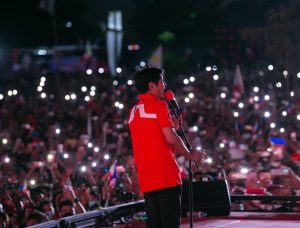Ferdinand Marcos Jr remains on track for a landslide victory at next week’s Philippine presidential election, according to the latest poll from Pulse Asia, which showed him commanding more support than the rest of the field combined.
According to the survey, which was conducted in April 16-21 and released yesterday, support for the son of the former dictator was holding steady at 56 percent, a remarkable 33 points ahead of the second-placed candidate, Vice President Leni Robredo, who had the support of 23 percent of respondents. Lagging far behind were former boxing champion Manny Pacquiao, who was the preferred choice of just 7 percent of respondents, followed by Manila Mayor Francisco “Isko Moreno” Domagoso (4 percent), and Senator Panfilo Lacson (2 percent), followed by a shoal of electoral minnows.
The survey shows practically no change from last month’s Pulse Asia survey, conducted in March 17-21, which showed Marcos and Robredo commanding 56 percent and 24 percent support, respectively. The same is true among the vice presidential candidates. Marcos’ running-mate Sara Duterte-Carpio, the mayor of Davao City and the daughter of President Rodrigo Duterte, remains the preferred candidate, commanding 55 percent support, followed by Senate President Tito Sotto (18 percent), Sen. Kiko Pangilinan (16 percent), and Dr. Willie Ong (3 percent).
The results of the Pulse Asia survey, the last that will be conducted prior to the May 9 election, appears to rule out a surprise, coming-from-behind win by Robredo, whose campaign has energized younger Filipinos fearful of the Marcos clan returning to the Malacañang Palace.
There is remarkable continuity in the poll results since the beginning of the campaign in February, in a country where elections often see wild swings. As the political scientist Clive Arguelles noted on Twitter, the Marcos -Duterte tandem “have been a clear favorite among Filipino voters since the start of the campaign period.”
This makes it likely that the Marcos family will complete its remarkable rehabilitation from the nadir of 1986, when Marcos senior was overthrown by a “people power” revolution and the family fled into exile in Hawaii. Indeed, the return has been gradual. Over the past decade, as memories of the depredations of Martial Law fade, a significant number of Filipinos have begun to look back on the era as a lost “golden age.”
Far from facing accountability for widespread corruption and human rights violations, the Marcos family were allowed to return to the Philippines in the early 1990s and, with the help of their accumulated and ill-gotten wealth, quickly returned to political prominence. Ferdinand’s wife Imelda has served several terms in the House of Representatives, while the couple’s eldest daughter Imee was elected to the Senate in 2019, after a long spell as governor of the family stronghold in Ilocos Norte. Marcos Jr has also served in the same two positions, and gradually lost out to Robredo in the race for the vice presidency in 2016.
The Marcos Reconquista poses significant questions about the state of Philippine democracy, six years after the Rodrigo Duterte hijacked the presidency on a platform of violent law-and-order populism.
A lot of Western media attention has focused on the Marcos campaign’s formidable online disinformation campaign, which has attacked his opponents while presenting a revisionist and sanitized image of his father’s Martial Law dictatorship. But as the historian Joseph Scalice noted in a Twitter thread last month, disinformation alone is insufficient to explain why such a large majority of Filipinos seems willing to return the Marcos clan to the presidency, a phenomenon that he argued has “deeper social and historical roots.”
Scalice said that the return of the Marcoses was a local reflection of the broader global crisis of democracy, and the accumulated legacies of U.S. colonial rule in the first half of the twentieth century. Like the rise of Donald Trump in the U.S., Marcos’ popularity also reflects years of elite failure to bring concrete benefits to the majority of Filipinos. “The Marcos campaign rides on a significant constituency of the lower middle class and remittance dependent poor,” he wrote, “who, after 35 years of the failed promises of liberal democracy to resolve the social cancers that wrack the country, are mobilized not by hope but despair.”

































